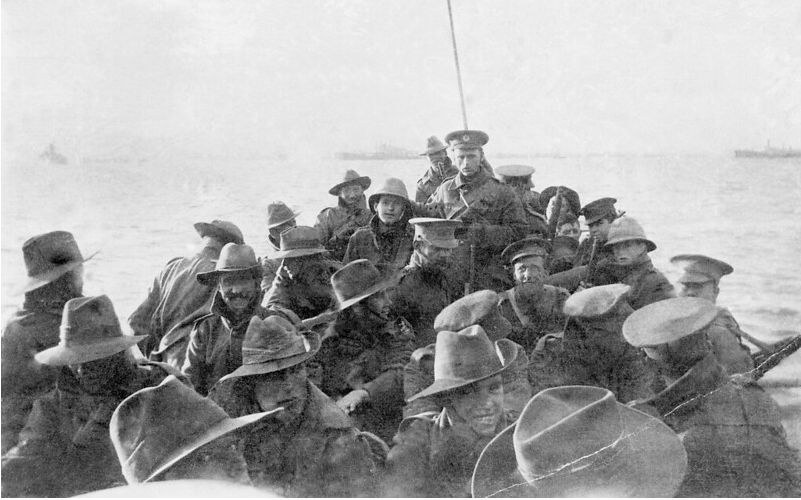‘Impactful projection’, 1915 style: Lest we forget Anzac Cove
April 25, 2024
Anzac Day. We mark it respectfully. True respect demands that we also not forget the essential question about the first ‘Anzac Day’ – 25 April 1915. Why were Australian soldiers at Anzac Cove in the first place?
In fact, Gallipoli provides a stunning lesson in the disasters that can follow from unwavering loyalty to a great ally, and a willingness to undertake alliance warfare far away. In essence, it was ‘impactful projection’ – 1915 style.
In the decade before 1914, both sides of Australian politics spent up big on new naval assets, and prepared covertly for an expeditionary force, as recommended by London. It was ‘interoperability’ morphing into ‘interchangeability’ – 1915 style.
Before Britain decided upon war at all, the Australian government jumped the gun on 3 August 1914, cabling an offer of an expeditionary force of 20,000 men ‘of any suggested composition to any destination desired by the Home Government. Force to be at the complete disposal of the Home Government’. It would be war at a distance, to achieve ‘deterrence by denial’ – 1915 style.
Charles Masterman in the British cabinet remembered the prime minister’s astonishment: ‘Asquith, after reading messages from the Dominions declaring their intentions to sally forth and attack whatever German possessions might be in their neighbourhood, observed, “Isn’t this extraordinary?”’
An editorial in The Times on 13 August was blunt: the force ‘is instantly under the orders of those who direct the movements of our armies. They will go without question and with eager alacrity, wherever they are sent. They will do what they are told to do. “Theirs is not to reason why.”’
While the new Labor prime minister, Andrew Fisher, did press in late 1914 for an imperial conference in London to weigh objects, costs and strategy. When London refused, he wrote back meekly on 15 February 1915: ‘When the King’s business will not fit in with our ideas, we do not press them.’
Why then Gallipoli? Essentially, the campaign aimed to win spoils for Tsarist Russia and bribe her into staying in the war. King George V got the ball rolling. Just ten days into the war against the Ottoman Empire, on 13 November 1914, the King asked Count Benckendorff, Russian Ambassador in London, to assure his cousin, Tsar Nicholas: ‘As for Constantinople, it is clear that it must be yours.’
Admiral Fisher told Admiral Jellicoe on 21 January 1915 that the operation in the Dardanelles was planned principally to avert the possibility that ‘Russia would make peace with Germany.’ He added on 27 February: ‘It is all Foreign Office business and pressure from Russia and France. We are their facile dupes.’
Most military and naval advisers were deeply sceptical of the campaign. But Winston Churchill, the young First Lord of the Admiralty, urged it vociferously. He was widely distrusted. Captain Herbert Richmond, Assistant Director of Naval Operations, wrote in his diary in August 1914: ‘I really believe Churchill is not sane.’
Urging that Constantinople be formally promised to Russia before the campaign, Sir Edward Grey, British Foreign Secretary, told the War Council on 3 March 1915, it was ‘very important to avoid anything in the nature of a breach with Russia, or any action which would incline Russia to make a separate peace.’ He added: ‘The direct fruits of these operations will, if the war is successful, be gathered entirely by Russia.’
So, in March 1915, under a secret agreement, Britain and France promised Russia the Straits and Constantinople – if the attack was successful. On 11 March Grey asked George Buchanan, the British Ambassador in Russia, to give Tsar Nicholas the good news: Britain was offering Russia ‘the greatest prize of the whole war.’
Once General Sir Ian Hamilton, commander of the Mediterranean Expeditionary Force, reached the Dardanelles, on 18 March he telegraphed Kitchener, Secretary of State for War: ‘Gallipoli on the spot looks a much tougher nut to crack than it did over the map in your office.’
But another purpose loomed: to lure neutral Italy into the war with prospective plunder in Turkey. It worked. So keen was Asquith to land Italy that, as Maurice Hankey, Secretary of the War Council, recorded on 7 April 1915, Asquith wanted to postpone the Gallipoli attack for fear that a ‘serious reverse there might result in choking off Italy.’ In the event, the landings bounced them in. The Italians signed up for war under the secret Treaty of London just as the Anzacs were digging in – on 26 April. It soothed some consciences. When Admiral Fisher told Margot Asquith on 13 May 1915 that he had always opposed ‘this mad expedition’, she countered: ‘[But] it’s helped to bring Italy in.’
As the casualties mounted, imperial priorities kept the troops there. Mulling over the disaster on 14 May 1915, Lord Kitchener feared withdrawal: ‘If we abandoned the enterprise, there would be a danger of a rising in the Moslem world.’
So, Australians died to keep Russia in the war, to lure Italy into it, and to keep down Muslim unrest across the British Empire. It was all, as the leading historian of Gallipoli Nicholas Lambert has written, ‘a wicked gamble.’
Such truths are normally avoided in official statements on our Anzac Day. The candour of the Chief of the New Zealand Defence Forces, Air Marshal Bruce Ferguson, at the 90th anniversary of the Gallipoli landings in 2005, stands alone: ‘Perhaps the Gallipoli campaign was the high-water mark of our nations’ imperial subservience. We learned that we must shake off the shackles of colonial dependence.’

